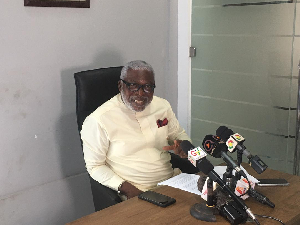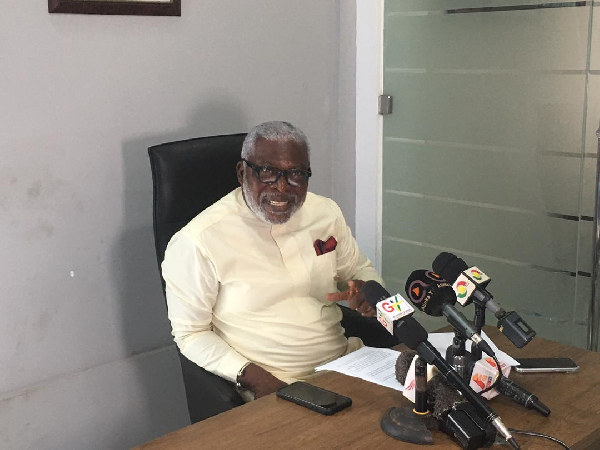 Kofi Capito, CEO of the consumer protection agency
Kofi Capito, CEO of the consumer protection agency
The Consumer Protection Authority (CPA) has hailed the recent Supreme Court ruling that strengthened the ban on celebrities endorsing alcoholic drinks.
The decision is in line with the Food and Drug Administration's (FDA) previous ban and represents a victory for the CPA, which has been advocating for this cause since 2007.
Speaking at a press conference in Accra, CPA CEO Kofi Kapito outlined the agency's stance on such advertising practices. He recalled a major victory the CPA achieved when it forced Guinness Ghana Limited to remove billboards featuring Black Stars players advertising alcohol. The action was escalated to the company's parent company, Britain's Diageo.
Citing the Quebec Protocol, which Ghana adheres to, Capito said packaging and communications for alcoholic drinks should not include people with a strong influence on young people, such as athletes or media personalities.
Additionally, the Ghana Association of Advertisers' code of ethics prohibits advertising alcohol during children's programming and the use of children or professional athletes in such advertising. Despite these restrictions, violations are rampant, according to Capito.
The CPA hopes that the Supreme Court’s approval will allow the FDA to enforce these rules more strictly and punish violators.
Capito also pointed to a worrying trend of hard liquor ads during prime-time news, potentially exposing children to alcohol, saying surveys show many high school students have seen such ads, raising concerns among parents and guardians.
The CPA has criticised celebrities who advertise alcoholic drinks, questioning their impact on impressionable young people. The agency suspects that manufacturers are using the influence of celebrities to boost sales while ignoring the welfare of young people.
Kofi Capito therefore pleaded with parents, especially mothers, to help the FDA and CPA enforce these advertising standards to safeguard the wellbeing of young people.
Please see below for the full press statement.
The CPA fully supports the Supreme Court ruling banning the use of celebrities and popular personalities in the advertising of alcoholic beverages in Ghana.
The CPA is very pleased with the Supreme Court’s decision to affirm the regulator, the FDA’s, previous prohibition on the use of celebrities in advertising alcoholic beverages.
The CPA has maintained this position since 2007, when it asked Guinness Ghana to remove billboards featuring black sports stars advertising the alcoholic drink – the issue was even taken up with the British parent company Diageo before the billboards were removed.
Article 11 of the Quebec Protocol, to which Ghana is a signatory, states the following about the code of ethics for advertising alcoholic beverages:
11. Alcoholic beverage packaging or advertising must not feature characters of football players, radio or television talk show hosts, doctors, film or theater performers, politicians or other influential figures among young people.
Also, the Ghana Association of Advertisers’ Code of Ethics (Advertising Practice pg. 12, 4.3.2) clearly states:
1. Advertising of alcoholic beverages is not permitted during religious or sports programming aimed at children.
2. Children, professional athletes, and pregnant women (appearing on television) cannot be used as models.
Despite these ethics, codes and guidelines, many media houses and advertising agencies wilfully ignore them for one reason or another best known to them.
Now that the Supreme Court has upheld its ruling on these codes, we sincerely pray that the FDA, which has recently been vocal about taking ruthless action against any agency that flouts these codes and guidelines, will act.
It is a great shame that Ghana is the only country where you can see hard liquor advertisements on primetime news bulletins. With a high number of children being exposed to alcoholic beverages before graduating from high school – 67% in a recent study – this should be of concern to all parents in the country.
The CPA is extremely disappointed with the actions of celebrities in promoting this idea and fears that without them advertising alcoholic products they would cease to exist.
We strongly believe that these celebrities are supported by alcoholic beverage companies who know the influence they have on the youth and use them to sell their products and make profits at the expense of the once vulnerable youth. No one is saying that celebrities should not advertise drinks, but as the Supreme Court has acknowledged, alcohol should not be advertised.
Therefore, CPA calls on all parents, especially mothers, to stand up and support the regulators, FDA and CPA, to ensure that rules and guidelines are followed to the fullest extent.
thank you.
Watch the latest episode of GhanaWeb TV's Everyday People below:
GhanaWeb, a leading digital news platform in Ghana, in partnership with Korle-Bu Teaching Hospital, has embarked on an aggressive campaign aimed at getting Parliament to pass a comprehensive law guiding organ harvesting, organ donation and transplantation in the country.

